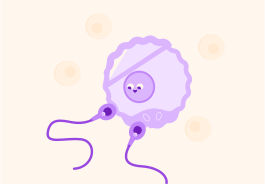YOU ARE LEARNING:
Treating Infertility: Hormones and IVF

Treating Infertility: Hormones and IVF
If a woman has hormone imbalances, she can be given FSH and LH to help with pregnancy. Alternatively, in vitro fertilisation (IVF) can help people have children, but it has disadvantages.
Infertility can affect both men and women, but luckily there are ways to help a couple conceive if they are struggling to conceive naturally. One of them is hormone treatment, the other is in vitro fertilisation (IVF).
Do you think both men and women can be given hormone treatment?

Women can get drugs containing hormones which stimulate the maturation and release of an egg from her ovary. Which hormones do you think these drugs contain?

Women can be given drugs containing FSH and LH to stimulate the production and release of mature eggs.
Women who receive this treatment have a higher chance of something happening. What do you think that thing is?

Women who have hormone treatment may become pregnant with more than one child, such as twins or triplets. This can lead to complications like premature birth and underweight babies.
Another method to treat infertility is in vitro fertilisation. This is where eggs are fertilised outside of the woman's body, either in a test tube or petri dish. What do you think in vitro means in English?

IVF can be used if a man's sperm count is low, or a woman has blocked fallopian tubes.
The first step in IVF is to give the mother hormones to initiate the development of a mature egg and release it from the follicle. Which hormones are given to the mother?

The mature eggs are removed from the mother.
They are put into a petri dish or test tube in the laboratory.
The mature eggs are then fertilised in the petri dish by sperm from the father.
The egg has a better chance of being fertilised in the petri dish or test tube than in the uterus.
If a man has low sperm count, a technique called intra-cytoplasmic sperm injection (ICSI) can be used to fertilise the eggs. What do you think this process does?

The eggs are then left in the petri dish to develop. What do they develop into?

Once these embryos grow into tiny balls of a few cells, one or two are inserted back into the mother. Where in the mother are they inserted?

IVF is very expensive, and the NHS can only fund treatment for selected couples. It costs a lot of money to do it privately. Also, the success rate is not very good, unfortunately, and it decreases with a woman's age.
Which of these do you think are some of the advantages of IVF treatment? Pick all the options you think are correct.

You can select multiple answers
Which of these do you think are some disadvantages of IVF treatment?

You can select multiple answers
